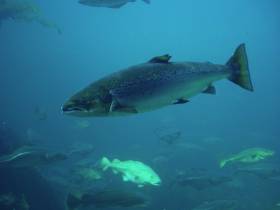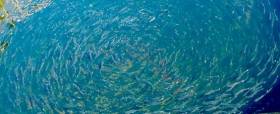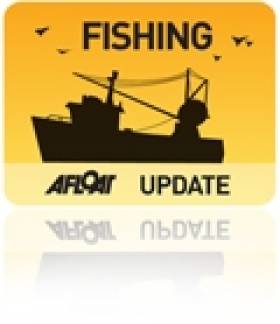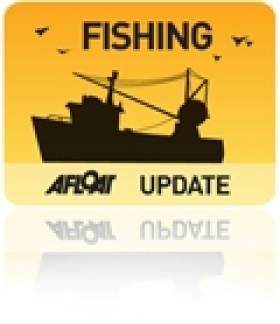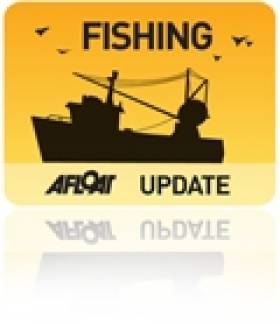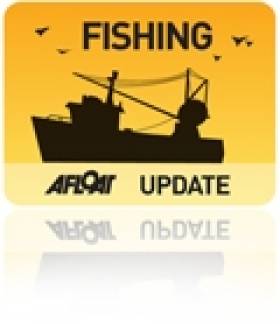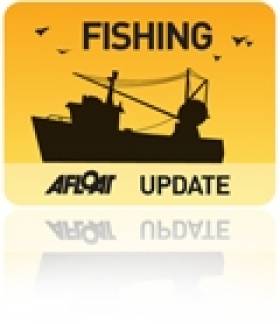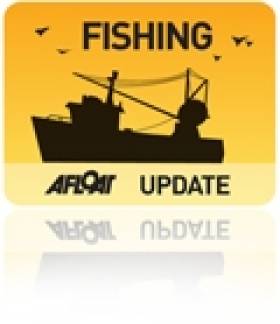Displaying items by tag: Seafood
Wild Salmon Now Available From Sustainable Irish Fisheries
#Seafood - Wild Atlantic salmon is now available at fish counters around Ireland.
This salmon comes from sustainably managed traditional net fisheries on estuaries and rivers around Ireland, where the number of returning salmon allows fish to be harvested while maintaining a healthy stock of spawning fish for future generations.
In total, the commercial quota for the wild Atlantic salmon harvest is just 11,131 from a total of 58,599 (angling and commercial combined), which makes it a premium and sought-after product.
Inland Fisheries Ireland (IFI) says wild Irish salmon can be regarded as truly organic, having lived its life in the wild, fed on wild fish and krill, and travelling thousands of miles on its long ocean migration, ensuring firm flesh and high levels of healthy Omega-3 oils.
Salmon conservation measures ensure that only appropriately tagged and recorded wild salmon, commercially caught within the state, may be sold.
As part of the wild salmon and sea trout tagging regulations, all legally caught wild salmon must have a valid gill tag (green in the case of draft net, white in the case of snap net fishing) or tail-tag, in the case of imported wild salmon, before processing, and only authorised dealers or commercial licensed salmon fishermen may sell them. It is not permitted to sell rod caught wild salmon within the state or sell wild salmon without a valid gill or tail tag attached.
Sean Kyne, Minister of State at the Department of Communications, Climate Action and Environment, said: “Wild Atlantic Salmon is a premium product. We all have a duty to ensure that conservation measures continue to be effective. Buying or selling illegally caught salmon jeopardises Ireland’s potential to have a sustainable salmon fishery into the future.”
Farmed salmon and organic farmed salmon is a very different product to wild salmon. Farmed salmon is widely available year round. If consumers have any doubts as to the origin of the salmon, please ask the supplier and help conserve Ireland's wonderful wild salmon resource. Farmed salmon being sold as wild should be reported to the Food Safety Authority. For more information visit www.fisheriesireland.ie.
New Marine Minister Announces €4.3M EMFF Grants To Seafood Processing & Aquaculture Sectors
#Seafood - New Marine Minister Michael Creed yesterday (Friday 27 May) announced the award of €4.3 million in grants to 51 seafood enterprises under five schemes launched earlier this year under the European Maritime and Fisheries Fund (EMFF) Operational Programme for the seafood sector.
The grants are co-funded by the Exchequer and EMFF and subject to terms and conditions.
“The EMFF Seafood Development Operational Programme was only adopted in December 2015 and I am delighted that it has so quickly seen these significant investments in our seafood sector provided with the financial supports that will ensure that these critical investments can be implemented," said the minister.
"Collectively, these investments will deliver jobs to coastal communities, develop new value added seafood products, develop new markets and further sales for our seafood products, and develop knowledge and new processes in aquaculture production, disease management and animal husbandry.
"These investments will assist seafood enterprises to contribute to the ambitious growth targets we have set for our processing and aquaculture sectors. I expect to announce further grant offers under these schemes in the coming months."
The grant offers are made under five EMFF Schemes. For the processing sector, €3.4 million was awarded to 27 enterprises under the Seafood Capital Investment Scheme towards total investment of €19.4 million. These investments are projected to create 316 jobs by 2019 and additional sales of €77 million by 2019.
In addition, €157,000 was awarded to four enterprises under the Seafood Scaling and New Market Development Scheme towards total investment of €335,000 and €164,000 was awarded to eight enterprises under the Seafood Innovation and Business Planning Scheme towards total investment of €328,000.
For the aquaculture sector, €199,000 was awarded to four enterprises under the Knowledge Gateway Scheme towards total investment of €305,000, while €382,000 was awarded to eight enterprises under the Sustainable Aquaculture Scheme towards total investment of in excess of €1 million.
Further details of the schemes concerned are available at the BIM website HERE.
€240m Seafood Sector Development Programme Announced
Eight schemes to commence implementation of Ireland’s new €240 million EMFF Seafood Development Programme for the period up to 2020 and beyond, co-funded by the Exchequer and European Maritime and Fisheries Fund were laucnhed today. This announcement follows approval of the Programme in December by Government and the European Commission.
Announcing the launch of the Programme Minister Coveney said “This new Operational Programme more than doubles the amount of development funding for our seafood sector and will be the source of development funding for Ireland’s seafood sector for at least the next 6 years to 2021. It will be the tool to implement the new Common Fisheries Policy, to deliver on FoodWise 2025 for the seafood sector and to deliver the National Strategic Plan for Sustainable Aquaculture Development.”
Minister Coveney launched the first suite of eight schemes to implement the new Programme, saying “I am delighted to announce today an integrated range of new schemes to drive the development of the fisheries, aquaculture and seafood processing sectors over the next 6 years. Perhaps the most important thing this new Seafood Development Programme will do in the years ahead is to strengthen our seafood sector and support the implementation of the new CFP, and in particular the landing obligation, thereby ensuring the future of our industry. I am allocating €67 million in total support to the sea fishing sector through this Programme and €45 million of this will go towards implementing the CFP. A key element of that will be a new €16m Sustainable Fisheries Scheme which I am announcing today. This new scheme will support the fishing fleet in making the adjustments necessary to reduce, to the maximum extent possible, unwanted catch or undersized fish and to make new investments on board the vessels and on shore to assist the industry in moving to a more sustainable and secure future.”
Minister Coveney said “today’s announcement sees two schemes being launched for the Aquaculture sector where €28.8m will be invested under the programme, a targeted inshore fisheries conservation scheme is also being launched and €6m will be invested in this sector under the programme. A Fisheries Local Development Scheme, involving €12m investment over the Programme, is being launched to support local development initiatives in coastal communities. Finally, a further three schemes are launched today to drive forward the development of the seafood processing sector so as to ensure maximum employment is created and value captured from the fish landed or produced in Ireland. In total €24m will be invested in the processing sector under the Programme”.
Minister Coveney added: “This Government is fully commitment to the seafood sector and the coastal communities who are dependent on fisheries and aquaculture. I have provided almost €36 million in 2016 to my Department and a range of implementing agencies to begin implementing the new Seafood Development Programme. I have provided BIM with €22 million in 2016 to implement these 8 and other new schemes that will be announced over the coming weeks including a scheme supporting Producer Organisations to prepare and administer Production and Marketing Plans. This scheme and other EMFF schemes with preferential rates available for Producer Organisations will facilitate the Producer Organisations in fulfilling their central role in the CFP reform process. Further schemes will be introduced over the coming months”
New Seafood Sector €241m Development Programme
The Minister for Agriculture, Food and the Marine, Simon Coveney TD, today announced that the European Commission has agreed and adopted Ireland’s new €241 million development programme for the seafood sector for the period up to 2020 co-funded by the Exchequer and European Maritime and Fisheries Fund.
In announcing the adoption of the Programme the Minister said “I am delighted to announce that our comprehensive €241 million investment package for the seafood sector has been adopted in law by the Commission and the Programme can now be implemented in full. My Department has been working on this for some time with stakeholders and the State agencies that will deliver the Programme. I expect now that Schemes will be rolled out from the beginning of 2016 to assist seafood enterprises to sustainably grow their production, add value to our seafood exports and create much needed employment in our coastal communities. Our Seafood sector is worth in the region of €850 million annually to our economy and I am aiming to achieve €1 billion sales by 2020.
#seafood – Minster for Agriculture, Food and the Marine, Simon Coveney TD today welcomed the EU Fisheries Commissioner, Karmenu Vella, to the Marine Institute in Galway.
Minister Coveney said "I am delighted to welcome Commissioner Vella to Ireland on his first official visit as Commissioner for Maritime Affairs and the Environment. While the Commissioner will have many opportunities over the coming days to learn about the overall importance of maritime affairs to Ireland, today our focus was on the seafood industry. In particular, this was an opportunity for me as Minister and the relevant stakeholders to provide the Commissioner with an overview on the seafood industry in Ireland and the challenges and opportunities in implementing the new reformed Common Fisheries Policy."
Commissioner Vella, who is responsible for Maritime Affairs and the Environment, is on a three day visit to Ireland during which he will have a number of engagements, the first of which was roundtable discussion with seafood industry stakeholders in the Marine Institute.
Minister Coveney hosted a discussion between the stakeholders - representing the catching sector, processors, the aquaculture sector as well as the environmental pillar – and the Commissioner during a two hour meeting today in the Marine Institute.
Minister Coveney went on to say "Today was a very valuable opportunity for seafood stakeholders to directly engage with Commissioner Vella and to express their views on a wide variety of issues of direct importance to coastal communities dependent on fisheries and aquaculture in Ireland. This kind of direct engagement will ensure that the Commissioner has a solid understanding of the issues of concern to Ireland as we implement the new CFP. In particular, stakeholders raised issues around the phasing in of the new discards ban or Landing obligation and the objective of achieving maximum sustainable yield or MSY by 2020 at the latest".
Marine Minister Announces Expanded & Wide-Ranging €241M Seafood Development Programme To 2020
#Seafood - Marine Minister Simon Coveney today (Friday 27 March) announced plans for a new €241-million development programme for the seafood sector for the period up to 2020.
The new programme will be co-funded by the EU through the European Maritime and Fisheries Fund and is subject to adoption by the European Commission.
A public consultation on the minister’s proposals for the new programme and a strategic environmental assessment were published today, with comments invited by 1 May 2015.
In announcing the new programme, Minister Coveney said: “Our seafood sector is worth in the region of €850 million annually to our economy, with exports growing by 70% since 2009 to €540 million. Seafood is widely recognised as a high growth area of our economy, with the potential to grow to €1 billion by 2020.
"The investment package I am announcing today will be a key element in achievement of that growth potential. It will provide the capital to assist seafood enterprises to sustainably grow their production, add value to our seafood exports and create much needed employment in our coastal communities.”
He went on to say that he "negotiated a doubling for the period to 2020 of the EU seafood development funds to Ireland. Under this programme, €147 million will be provided to Ireland under the European Maritime and Fisheries Fund. Government is providing an additional €94 million in co-funding, demonstrating our commitment to growing and developing the sector.”
The minister said he recognises "at the outset that there will be many views on how these funds would best be invested and on which particular areas should be prioritised.
"Following a detailed process of analysing the investment needs of the sector, I am proposing today that we invest €42 million in implementing the new Common Fisheries Policy, including measures for developing more selective fishing gear, and supporting the new discards ban.
"I am also proposing that we invest a further €6 million to build on the good work that has been ongoing over recent months to revive and sustainably grow our inshore fisheries; €30 million to sustainably develop our aquaculture industry and implement a new national plan for aquaculture that I will be announcing shortly; €12 million to grow the seafood based economies of our coastal communities through community-led fisheries local action aroups; and €41 million to grow markets for our seafood products, develop our seafood processing industry and develop new value added products for those markets.
"I am also making available almost €10 million to support implementation of EU environmental law, to help protect vulnerable habitats and species and ensure that our seafood sector continues to operate and grow in a sustainable manner.”
The Minister concluded by inviting comments on these proposals by 1 May, and said he looks forward "to considering all views and discussing them with stakeholders”.
18 Seafood Processing Companies Get €2.7m in Grant-Aid
#fishing – The Minister for Agriculture, Food and the Marine, Simon Coveney TD, announced today the award of €2.7 million in grant-aid to 18 seafood processing companies under the 2015 Seafood Processing Business Investment Scheme. Taken in conjunction with private sector investment, the total investment will be almost €9 million in 2015. The supported projects are projected to deliver 145 Jobs and €41 million in additional sales by 2017. The grants are co-funded by the Department of Agriculture Food and the Marine and the European Fisheries Fund under the Seafood Development Programme.
Minister Coveney, in stressing the value of this grant-aid package to the Seafood Processing industry said, "this investment of almost €9 million in 2015 will enable our innovative seafood processers to continue their strong growth trend over recent years that will see the sector continuing to grow sales internationally and grow employment in our coastal communities. It will put the required technology, infrastructure and standards in place to allow these businesses develop added value seafood products that are in great demand on the global market."
The Minister concluded "the Irish seafood processing industry generally, in line with Government policy under the Food Harvest 2020 plan, has strong plans to significantly grow its business further in the years ahead. I believe we can look forward with confidence to seeing the seafood processing sector continuing to be an integral part of Government's policy to grow our indigenous seafood industry".
Hong Kong Bans Donegal Oysters Over Food Poisoning Scare
#Seafood - Donegal's oyster industry has been hit by an import ban in Hong Kong over an outbreak of food poisoning.
According to The Irish Times, food safety investigators in the Chinese territory were notified by Irish authorities two weeks ago that the presence of norovirus was confirmed at a raw oyster processing plant in the north-eastern county that services the crucial Asian market.
Hong Kong subsequently banned the import of raw oysters from Donegal "for the sake of prudence". More HERE.
Shellfish Information Meetings Set For April & May
#Shellfish - The Food Safety Authority of Ireland (FSAI) is holding a series of Shellfish Regional Information Meetings around the coast in April and May.
The informal events, held in association with the Sea-Fisheries Protection Authority (SFPA), the Marine Institute and Bord Iascaigh Mhara (BIM), aim to provide an opportunity for all those involved in the shellfish industry to learn more about the role of the Shellfish Safety Monitoring Programme and how it assists industry to ensure that live bivalve molluscs placed on the market meet the highest standards of food safety.
This series of events will focus on microbiological classification of shellfish production areas but will also cover topics such as biotoxin and phytoplankton monitoring, phytoplankton sampling and viruses.
The first of these meetings takes place on 15 April at the SFPA office in Clonakilty, Co Cork, followed by 16 April at the Brehon Hotel in Killarney, Co Kerry.
On 27 April, the meeting moves to the Clann Ri Hotel in Letterkenny, Co Donegal, followed on 28 April at the Marine Institute in Oranmore, Co Galway.
The final meeting in the series will be held on 6 May at the FSAI office on Lower Abbey Street in Dublin city centre.
Registration for the events in Donegal, Galway, Cork and Dublin is from 1pm with a light lunch served. These sessions will run from 1:30pm to 4:30pm. In Kerry, registration is from 9:30am with tea/coffee served. The sessions will run from 10am to 1pm, when a light lunch will be served.
To register for one of these free half-day events, click on the any of the links above or phone Lorna Tallon on 01 817 1398.
Irish Seafood Takes Pride Of Place At World Organic Trade Fair
#Seafood - Three seafood companies were among the eight organic food businesses exhibiting at this year's Biofach event in Germany.
Kush Seafarms in Co Kerry, Irish Seaspray in Co Galway and the Irish Organic Salmon Company in Co Donegal all return after last year's exhibiting at the World Organic Trade Fair in Nuremberg.
And they were joined at the opening of their stand by Minister of State Tom Hayes, who reiterated the opportunities that exists for the organic food market at home and abroad.
“Participation in Biofach allows our organic producers and processors to showcase Irish organic produce on a worldwide stage," he said. “It also provides ample opportunities to network with purchasing decision makers, both from Europe and further afield.”
Minister Hayes also paid tribute to Bord Bia “for the professional way that they have organised the Irish food industry’s participation at this very important event.”
He concluded: “I wish all participants here today every success over the coming days and I hope that you develop the partnerships and contacts that will help your business continue to grow into the future.”
Eight innovative Irish seafood and food companies are participating at the event, which runs till Saturday 14 February.
Last year, Biofach attracted over 2,000 exhibitors and in excess of 42,000 trade visitors attended the event.



























